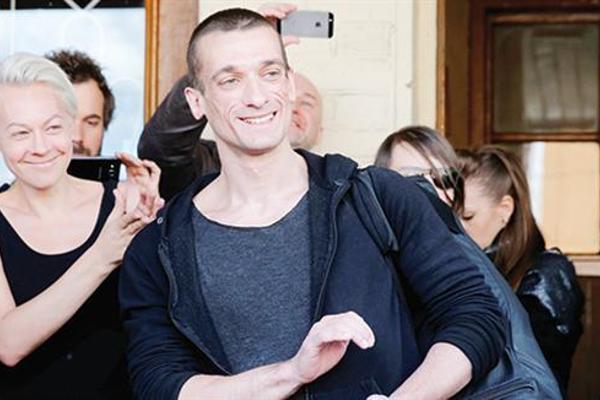Russian court frees artist with fine for fire protest
MOSCOW – Agence France-Presse


REUTERS photo
A Moscow court on June 8 released radical performance artist Pyotr Pavlensky with a hefty fine for torching the door of the security services headquarters in a rare show of leniency by the authorities.A judge ordered the artist to pay a fine of 500,000 rubles ($7800, 6800 euros) after finding him guilty, saying that the punishment was reduced due to the seven months Pavlensky has already spent behind bars.
He was also ordered to pay damages of 481,000 rubles to the FSB security agency to cover the cost of the repairs.
Pavlensky had faced to three years in jail on charges of damaging a cultural site for dousing the doors of the agency’s Moscow headquarters with gasoline and setting it on fire in a November performance he called “Threat.”
“Thanks to all for the support, thanks to those who were not afraid,” Pavlensky told the crowd of journalists crammed into the courtroom, addressing them from the defendants’ cage.
“I can’t pay the fine,” he added, pleading financial hardship.
Pavlensky’s trial was the most closely-watched of an anti-Kremlin artist since Russia jailed members of protest punk group Pussy Riot in 2012 for performing a song attacking Russian President Vladimir Putin in Moscow’s main cathedral. Their incarceration caused an outcry in the West.
Pavlensky, a gaunt 32-year-old figure known for intensely physical performances to highlight Russia’s restrictions on political freedoms, said he started the fire at the FSB to highlight its “method of continuous terror” to control Russian society.
The FSB is the successor of the feared Soviet-era KGB.
Its infamous central Moscow building was where some prominent figures were detained and executed during the Stalinist purges.
Pavlensky -- who has won international critical acclaim for his work -- has previously nailed his scrotum to Red Square, sewn his lips together, wrapped himself in barbed wire and chopped off part of his ear.
He refused to testify at his trial, speaking only to journalists and supporters.
While his defense team fought for his freedom, he himself demanded that the judge try him for terrorism.
He has consistently argued he should face terrorism charges, likening his case to that of Ukrainian film maker Oleg Sentsov who was convicted of terrorism last year for setting fire to the offices of a pro-Kremlin party in Russian-annexed Crimea.
